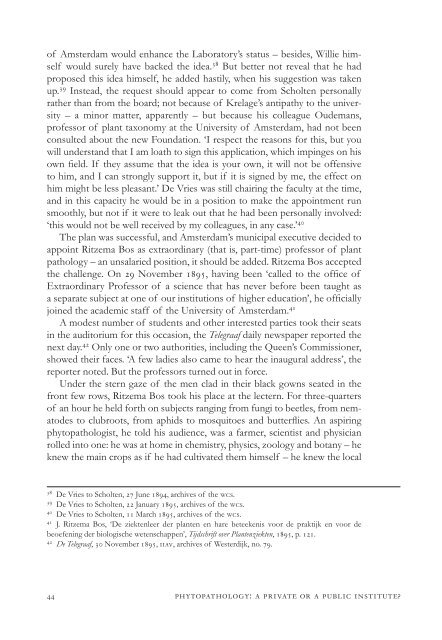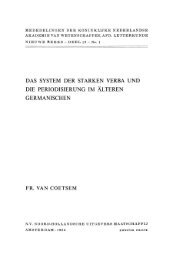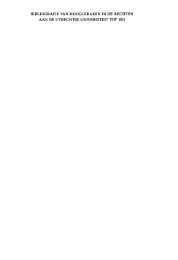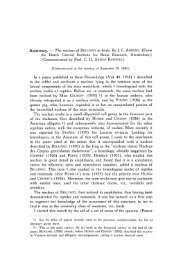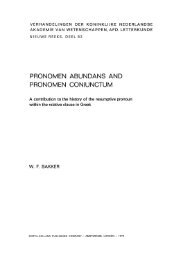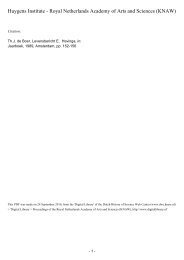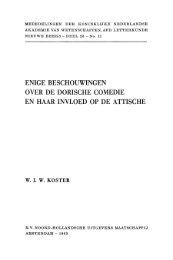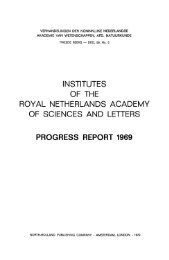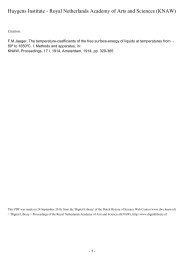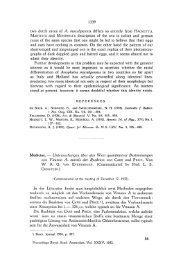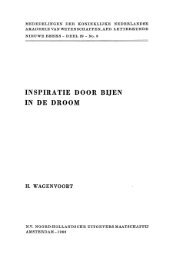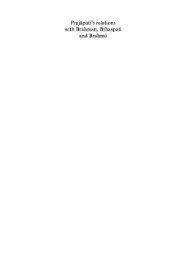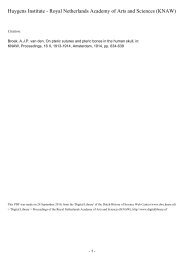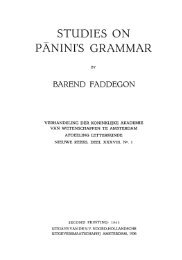PDF (full volume) - DWC - KNAW
PDF (full volume) - DWC - KNAW
PDF (full volume) - DWC - KNAW
Create successful ePaper yourself
Turn your PDF publications into a flip-book with our unique Google optimized e-Paper software.
of Amsterdam would enhance the Laboratory’s status – besides, Willie himself<br />
would surely have backed the idea. 38 But better not reveal that he had<br />
proposed this idea himself, he added hastily, when his suggestion was taken<br />
up. 39 Instead, the request should appear to come from Scholten personally<br />
rather than from the board; not because of Krelage’s antipathy to the university<br />
– a minor matter, apparently – but because his colleague Oudemans,<br />
professor of plant taxonomy at the University of Amsterdam, had not been<br />
consulted about the new Foundation. ‘I respect the reasons for this, but you<br />
will understand that I am loath to sign this application, which impinges on his<br />
own fi eld. If they assume that the idea is your own, it will not be offensive<br />
to him, and I can strongly support it, but if it is signed by me, the effect on<br />
him might be less pleasant.’ De Vries was still chairing the faculty at the time,<br />
and in this capacity he would be in a position to make the appointment run<br />
smoothly, but not if it were to leak out that he had been personally involved:<br />
‘this would not be well received by my colleagues, in any case.’ 40<br />
The plan was successful, and Amsterdam’s municipal executive decided to<br />
appoint Ritzema Bos as extraordinary (that is, part-time) professor of plant<br />
pathology – an unsalaried position, it should be added. Ritzema Bos accepted<br />
the challenge. On 29 November 1895, having been ‘called to the offi ce of<br />
Extraordinary Professor of a science that has never before been taught as<br />
a separate subject at one of our institutions of higher education’, he offi cially<br />
joined the academic staff of the University of Amsterdam. 41<br />
A modest number of students and other interested parties took their seats<br />
in the auditorium for this occasion, the Telegraaf daily newspaper reported the<br />
next day. 42 Only one or two authorities, including the Queen’s Commissioner,<br />
showed their faces. ‘A few ladies also came to hear the inaugural address’, the<br />
reporter noted. But the professors turned out in force.<br />
Under the stern gaze of the men clad in their black gowns seated in the<br />
front few rows, Ritzema Bos took his place at the lectern. For three-quarters<br />
of an hour he held forth on subjects ranging from fungi to beetles, from nematodes<br />
to clubroots, from aphids to mosquitoes and butterfl ies. An aspiring<br />
phytopathologist, he told his audience, was a farmer, scientist and physician<br />
rolled into one: he was at home in chemistry, physics, zoology and botany – he<br />
knew the main crops as if he had cultivated them himself – he knew the local<br />
38 De Vries to Scholten, 27 June 1894, archives of the wcs.<br />
39 De Vries to Scholten, 22 January 1895, archives of the wcs.<br />
40 De Vries to Scholten, 11 March 1895, archives of the wcs.<br />
41 J. Ritzema Bos, ‘De ziektenleer der planten en hare beteekenis voor de praktijk en voor de<br />
beoefening der biologische wetenschappen’, Tijdschrift over Plantenziekten, 1895, p. 121.<br />
42 De Telegraaf, 30 November 1895, iiav, archives of Westerdijk, no. 79.<br />
44 phytopathology: a private or a public institute?


